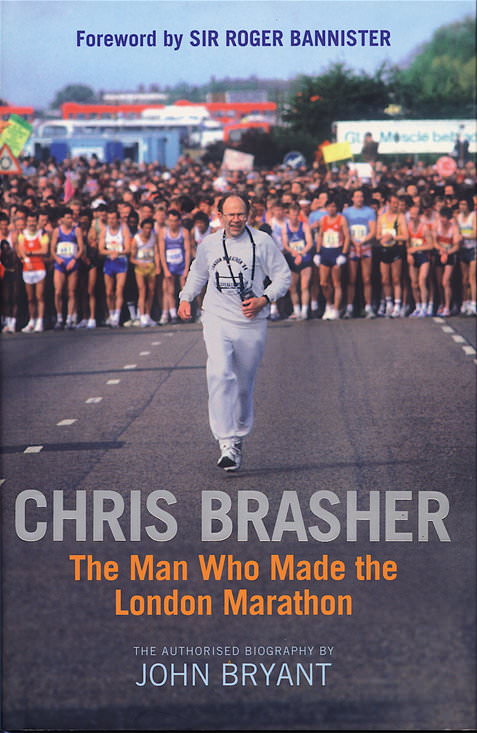Book Review
Chris Brasher: The Man Who Made the London Marathon by John Bryant. London: Aurum Press, 2012
 |
A surprise winner of an Olympic track gold medal, a self-made multi-millionaire, a nationally famous sports journalist and the founder of the famous London Marathon, Chris Brasher led a life that cries out for a biography. And who better to do it than John Bryant, himself a lifelong runner, a 40-year veteran of Fleet Street, and a close friend of Brasher? It is true that good friends aren’t often the best choice for an objective biography, but Bryant is not afraid to bring out the less positive aspects of Brasher’s character. Sports biographies often tend toward hagiography, Frantisek Kozik’s politically motivated Zatopek the Marathon Victor being the classic example, but this fine biography of Brasher, though full of admiration, is no whitewash.
In fact John Bryant tries hard to get to the essence of Brasher’s complex personality. As Roger Bannister says in the Foreword, Brasher “had a manic energy and single-mindedness that brooked no opposition.” Such qualities lead to gold medals and success in public life, but they also lead to conflict and hurt. Bryant has talked to many people who had disputes with Brasher. Tony Ward, the British coach, made this point: “Brasher’s personality induces a love-hate relationship with many people that he comes into contact with.” (p. 228)
But all this is not to say that Brasher was not an admirable and caring human being. Indeed this book is full of people who respected him. The outpouring of emotion following his death is testament to the popularity of this British public figure.
Bryant spends many pages on the crucial early years when Brasher was a shy and stammering schoolboy. And he convincingly shows that running was basis of Brasher’s development into a determined and relentless achiever. Early running success at school convinced Brasher that he wasn’t a follower or an “also-ran.” It later gave him a self-belief that took him out of a dead-end factory job and into university and that changed him from an average club runner into a world-class steeplechaser.
This biography spends roughly a third of its pages on Brasher’s childhood and athletic successes. This is followed by five chapters on the years before the London Marathon: marriage, orienteering, journalism and business (sports equipment). The chapters on the founding and development of the London Marathon are excellent, bringing out all the hard work and persistence that Brasher needed to achieve success. Especially good is the material on the celebrated lawsuit over Brasher’s role in the Marathon. The last chapters cover his love of horseracing and his generous financial contributions to preserve tracts of natural environment in Scotland, Wales and England. And in a brilliant final chapter, taking a personal approach for the first time, Bryant movingly describes Brasher’s final illness and death.
John Bryant has written one of the finest sports biographies. The 300 pages are full of well-researched material. Further, the writing throughout has a quality that befits a lifetime journalist and editor of Fleet Street. This, for example: “Still, whether it was mountains, running or car rallying—whatever enthusiasm caught his eye—Brasher would be off and chasing his latest passion. He was very like Mr. Toad in The Wind in the Willows, always up for a new craze, always ready to follow a new fashion, always searching for a new piece of heaven.” (pp.143-4). Even some of the chapter titles are worth savouring: “No fags, no Mountains, No Women,” “Falling out of Love with the Raddled Old Tart,” and “No, No, No, Not Brasher.” And all his chapter epigraphs are well chosen; I especially like Chris Chataway’s “Chris Brasher has done more for the corporate spirit of London that anyone since Adolf Hitler,” and George Bernard Shaw’s “The reasonable man adapts himself to the world; the unreasonable on persists in trying to adapt the world to himself. Therefore, all progress depends on the unreasonable man.”
If you have read this far, it will come as no surprise that I highly recommend this biography.
Note: You will find a profile of Chris Brasher on this site. Needless to say, Bryant’s book was of great help in writing this profile.
Leave a Comment